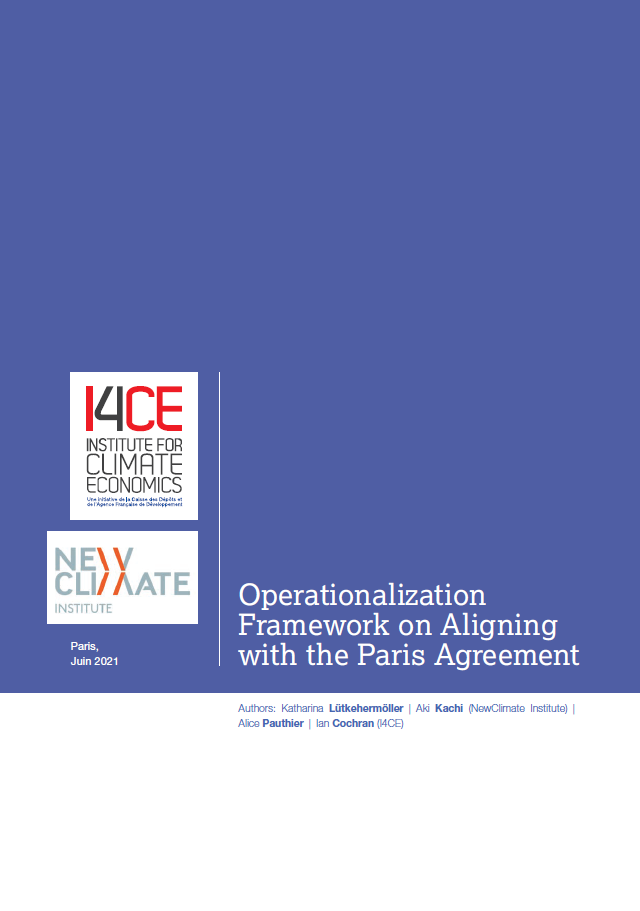Operationalization Framework on Aligning with the Paris Agreement
In 2017, the International Development Finance Club (IDFC) together with the group of Multilateral Development Banks (MDBs) made a joint commitment to “align financial flows with the Paris Agreement”. Since its commitment, the IDFC had focused its efforts on identifying what alignment means and implies. In 2018, the IDFC commissioned a study by I4CE and the Climate Policy Initiative (CPI) to establish a theoretical and conceptual basis for alignment and what internal changes it implies. Moving a step further, the IDFC mandated NewClimate Institute and I4CE to develop an operationalization framework on Aligning with the Paris Agreement. Beyond its usefulness for IDFC members, this ‘toolbox’ can help all financial institutions in their journey to alignment.
This Operationalization Framework is based on the premise that aligning with the objectives of the Paris Agreement is a comprehensive strategic process. It implies that financial institutions adapt internal priorities and procedures to make all their activities ‘consistent’ with the Paris Agreement as soon as possible and support the transformation of activities and value chains across sectors and countries.
There is no single tool or metric that will allow an institution to align with the Paris Agreement. Rather, a tailored combination of tools will be needed for each financial institution, based on its individual mandate, alignment objectives and strategy, its institutional culture as well as areas and sectors of interventions.
A number of already available tools, approaches and methodologies allow financial institutions to begin immediately to align with the Paris Agreement. Many tools have already been implemented as part of financial institutions’ climate mainstreaming efforts. IDFC members and other financial institutions can therefore build on this existing experience and learn from the experience of their homologues to develop their alignment strategies. These tools and methodologies may however need to be revised, adapted, or further developed to meet with the level of ambition of the Paris Agreement objectives.
Given the required changes in how financial institutions operate, aligning with the Paris Agreement must be seen as a journey. In many instances, financial institutions will implement it step-by-step depending on their respective mandates and capacities; it is key that development banks prioritize their efforts. The combination of tools and metrics used by financial institutions will evolve over time as they continually review and develop new tools and approaches to respond to the societal, economic, and technological transitions.
This operationalization framework is designed to serve as an initial guide to assist IDFC members in the operationalization of their commitment. It is structured around the six principles of the 2018 IDFC position paper that lays out how members aim to achieve their alignment commitment. It provides guidance on tools and approaches across four main principal questions around Paris alignment:
• Objectives: What concrete outcomes does my institution aim to achieve?
• Key aspects: What are the key aspects of each type of tool, what aspects do I need to pay attention to when using this type of tool? What changes may need to occur within my institution and who needs to be involved? What information do I need?
• Existing Approaches and Tools: What approaches and tools are available to make these changes? What are their strengths and weaknesses, how do they address the different dimensions of Paris-alignment?
• Use recommendations for Paris-alignment: What do I need to consider if I want to implement the principle to be fully Paris-aligned?
As Paris alignment is a dynamic process, this operationalization framework will need to be revised, adapted, and further developed over time as IDFC members progress in this alignment journey and as new tools and approaches emerge.
